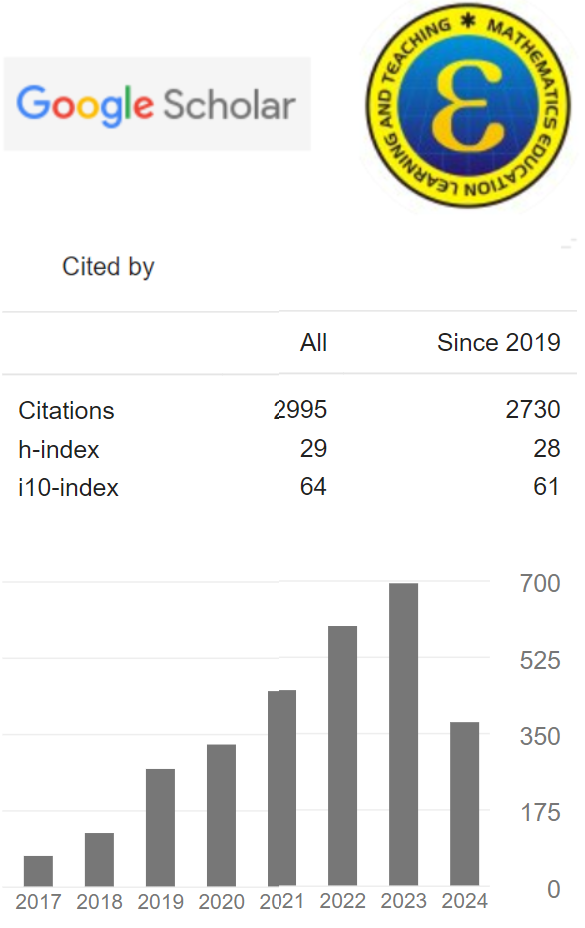An Analysis of Personality Styles; Does mathematics anxiety change with adversity Quotient?
(1) Universitas Muhammadiyah Yogyakarta
(*) Corresponding Author
Abstract
Keywords
Full Text:
PDFReferences
Acharya, B. R. (2017). Factors affecting difficulties in learning mathematics by mathematics learners. International Journal of Elementary Education, 6(2), 8-15. https://doi.org/10.11648/j.ijeedu.20170602.11
Azwar, S. (2017). Metode penelitian psikologi. Yogyakarta: Pustaka Pelajar.
Boaler, J. (Ed.). (2000). Multiple perspectives on mathematics teaching and learning (Vol. 1). Greenwood Publishing Group.
Buckley, S., Reid, K., Goos, M., Lipp, O. V., & Thomson, S. (2016). Understanding and addressing mathematics anxiety using perspectives from education, psychology and neuroscience. Australian Journal of Education, 60(2), 157-170. https://doi.org/10.1177/0004944116653000
Chinn, S. (2020). The trouble with maths: A practical guide to helping learners with numeracy difficulties. Routledge.
Dacey, J. S., Mack, M. D., & Fiore, L. B. (2016). Your anxious child: How parents and teachers can relieve anxiety in children. John Wiley & Sons.
English, L. D., & Halford, G. S. (2012). Mathematics education: Models and processes. Routledge.
Hadi, F. Z., Fathurrohman, M., & Santosa, C. A. H. F. (2020). Kecemasan Matematika Dan Kemampuan Berpikir Kritis Matematis Siswa Di Sekolah Menengah Pertama. ALGORITMA Journal of Mathematics Education (AJME), 2(1), 59-72. https://doi.org/10.15408/ajme.v2i1.16312
Hembree, R. (1990). The nature, effects, and relief of mathematics anxiety. Journal for research in mathematics education, 21(1), 33-46. https://doi.org/10.5951/jresematheduc.21.1.0033
Lave, J. (1988). Cognition in practice: Mind, mathematics and culture in everyday life. Cambridge University Press.
Luo, X., Wang, F., & Luo, Z. (2009). Investigation and analysis of mathematics anxiety in middle school students. Journal of mathematics Education, 2(2), 12-19.
Masten, A. S., Best, K. M., & Garmezy, N. (1990). Resilience and development: Contributions from the study of children who overcome adversity. Development and psychopathology, 2(4), 425-444. https://doi.org/10.1017/s0954579400005812
Mayudana, I. K. Y. (2020). Hubungan Kecemasan Matematis Dan Adversity Quotient Terhadap Hasil Belajar Matematika Siswa Kelas X SMK TI Bali Global Denpasar Tahun Pelajaran 2019/2020. Widyadari: Jurnal Pendidikan, 21(2), 544-555. https://doi.org/10.5281/zenodo.4048974
Namkung, J. M., Peng, P., & Lin, X. (2019). The relation between mathematics anxiety and mathematics performance among school-aged students: a meta-analysis. Review of Educational Research, 89(3), 459-496. https://doi.org/10.3102/0034654319843494
Priyanto, D. (2017). Tingkat dan faktor kecemasan matematika pada siswa Sekolah Menengah Pertama. Jurnal Pendidikan dan Pembelajaran Khatulistiwa, 6(10).1-12.
Qausarina, H. (2016). Pengaruh kecemasan matematika (math anxiety) terhadap hasil belajar matematika siswa kelas X SMA Negeri 11 Banda Aceh. Universitas Islam Negeri Ar-Raniry Darussalam-Banda Aceh.
Rahmelia, A. (2016). Hubungan adversity quotient dengan kecemasan akademik pada mahasiswa yang sedang mengerjakan skripsi di Universitas Andalas (Doctoral dissertation, Universitas Andalas).
Soni, A., & Kumari, S. (2017). The role of parental math anxiety and math attitude in their children’s math achievement. International Journal of Science and Mathematics Education, 15(2), 331-347. https://doi.org/10.1007/s10763-015-9687-5
Stoehr, K. J. (2017). Mathematics anxiety: One size does not fit all. Journal of Teacher Education, 68(1), 69-84. https://doi.org/10.1177/0022487116676316
Stoltz, P. G., & Stoltz, P. (2000). Adversity Quotient@ Work: Make Everyday Challenges the Key to Your Success--Putting the Principles of AQ Into Action. New York: William Morrow.
Surya, E., & Putri, F. A. (2017). Improving mathematical problem-solving ability and self-confidence of high school students through contextual learning model. Journal on Mathematics Education, 8(1), 85-94. https://doi.org/10.22342/jme.8.1.3324.85-94
Wijaya, A., van den Heuvel-Panhuizen, M., & Doorman, M. (2015). Teachers’ teaching practices and beliefs regarding context-based tasks and their relation with students’ difficulties in solving these tasks. Mathematics Education Research Journal, 27(4), 637-662. https://doi.org/10.1007/s13394-015-0157-8
Wirayadnya, I. K. (2018). Contribution of Adversity Quotient, Anxiety, and Achievement Motivation toward Students’ Speaking Competency. Lingua Scientia, 19(1), 11-20.
Yayuk, E. (2020). Primary School Students' Creative Thinking Skills in Mathematics Problem Solving. European Journal of Educational Research, 9(3), 1281-1295. https://doi.org/10.12973/eu-jer.9.3.1281
DOI: 10.24235/eduma.v12i1.12888
Article Metrics
Abstract view : 57 timesPDF - 7 times
Refbacks
- There are currently no refbacks.
Copyright (c) 2024 EduMa: Mathematics education learning and teachingâ€â€â€Ž


.png)










